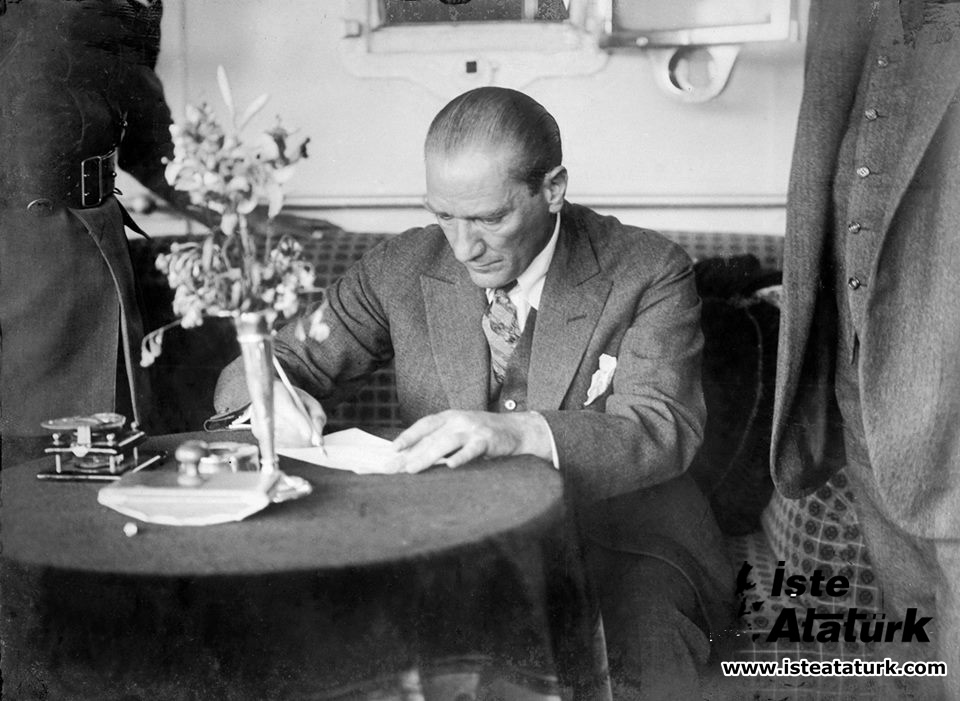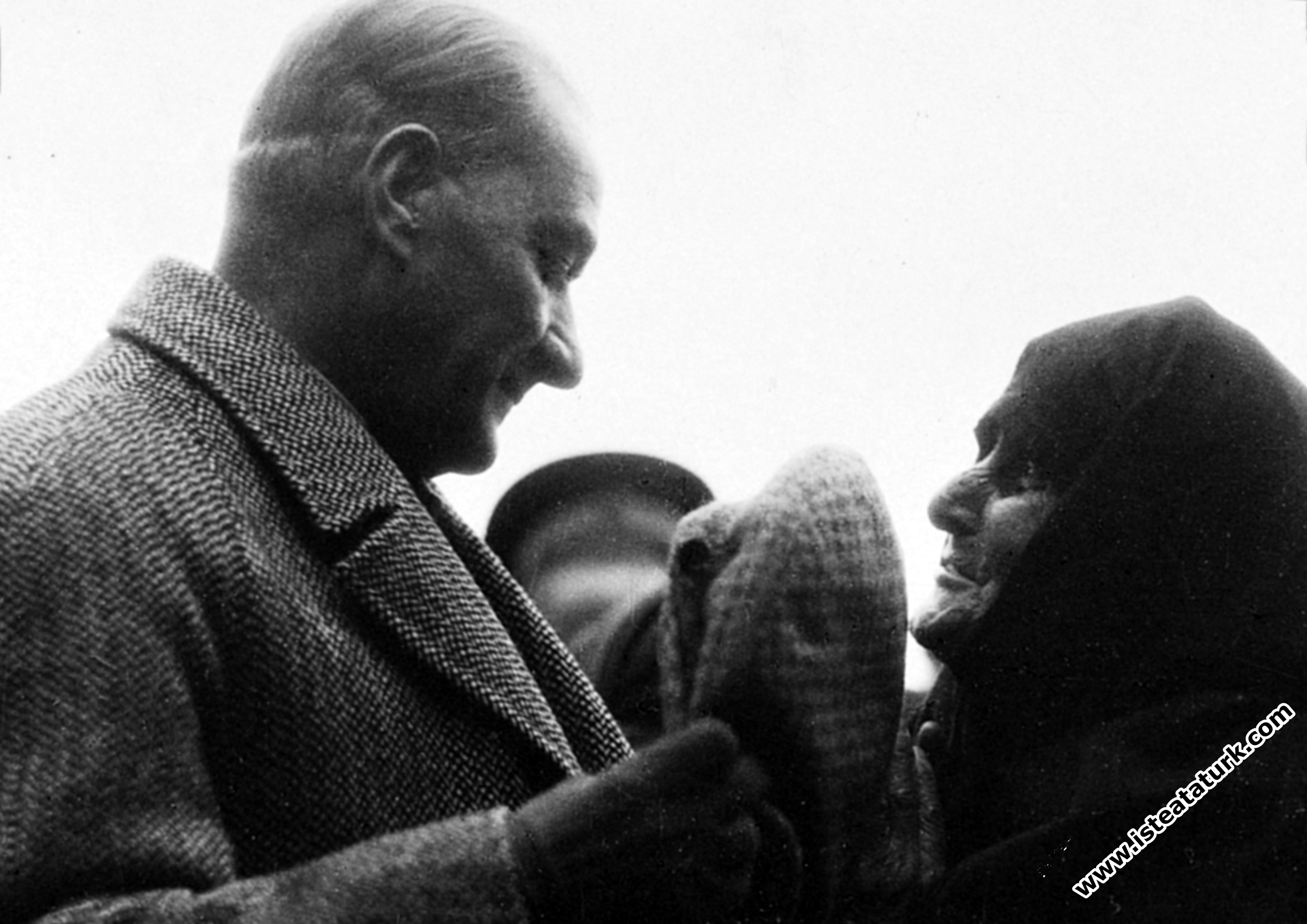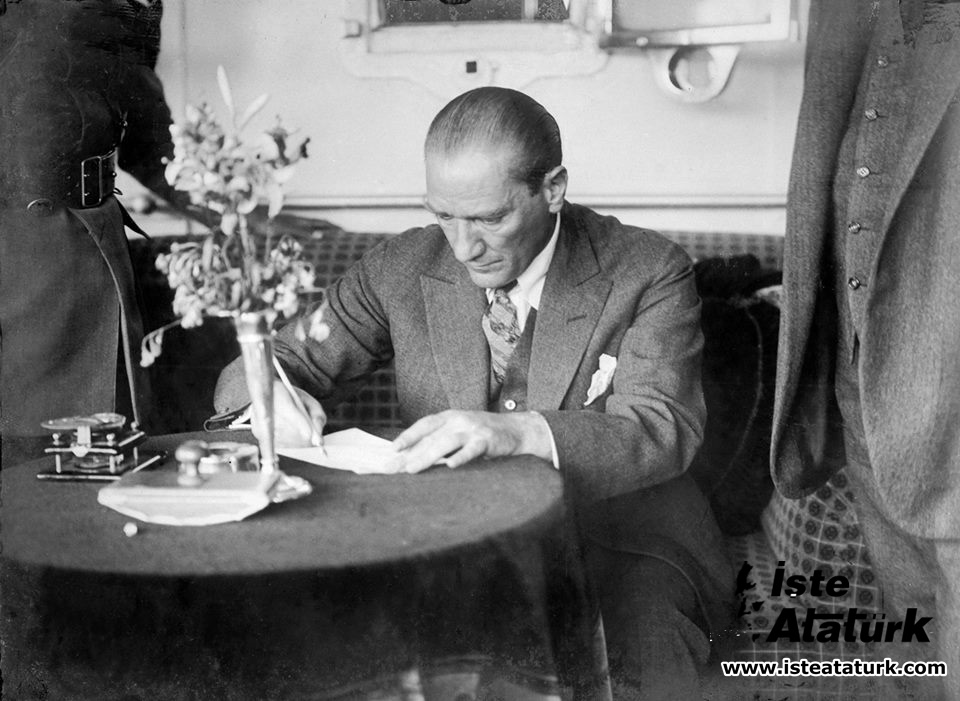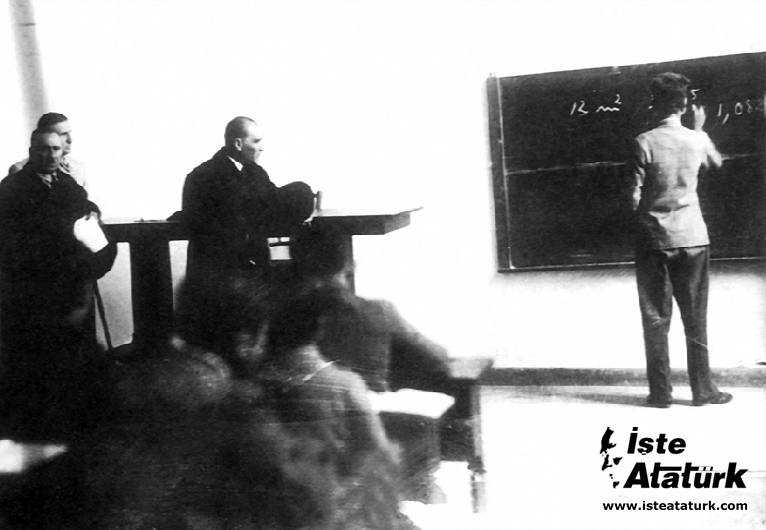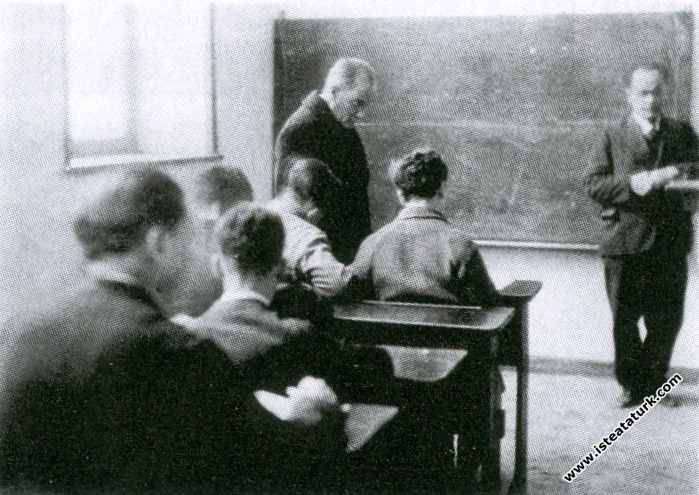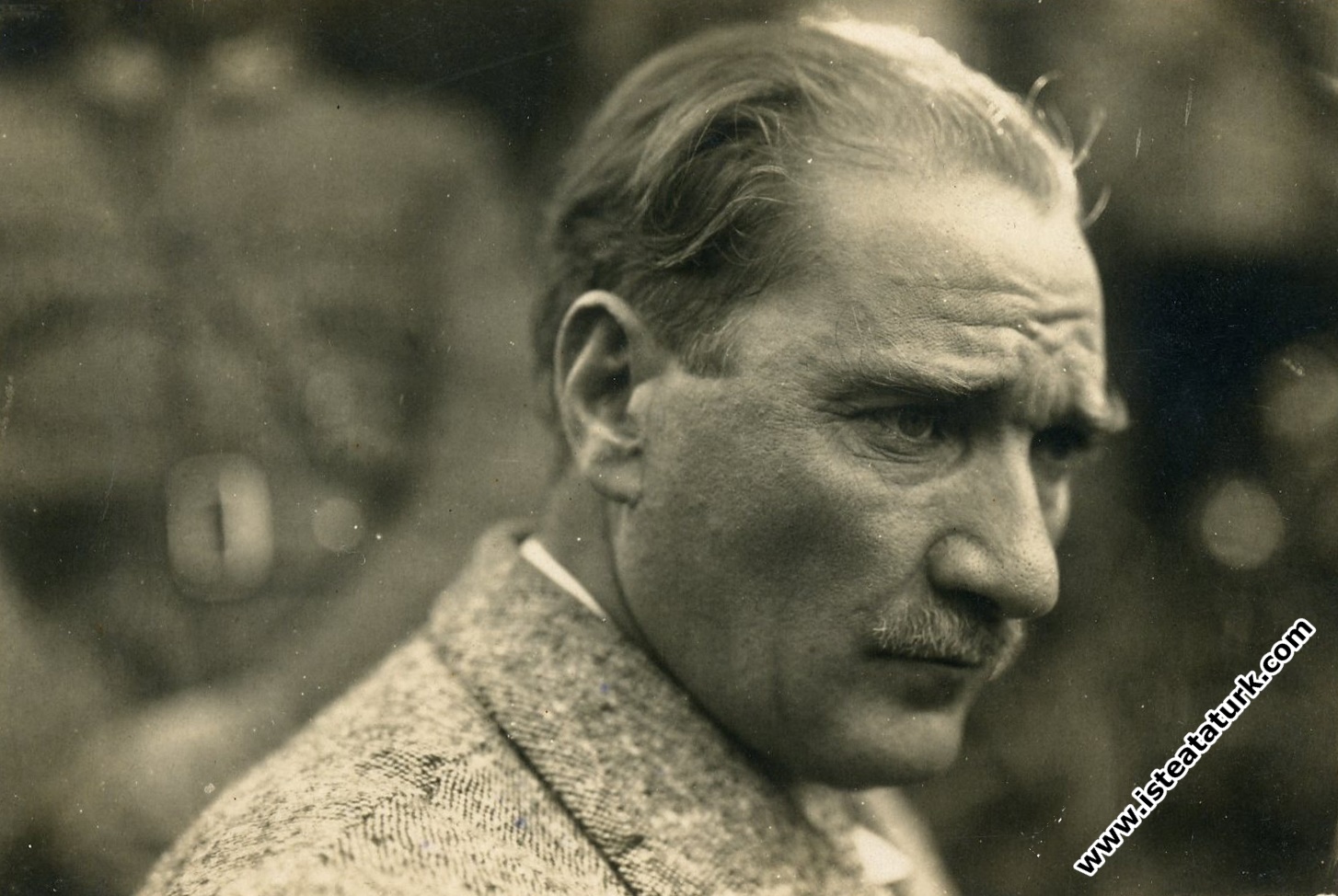
Atatürk and Peace
Character Size
“War must be necessary and vital. War is murder unless the life of the nation is faced with dangers.” Mustafa Kemal Atatürk
ATATÜRK and PEACE
Mustafa Kemal Atatürk, who was a close witness of the bitter defeats of the Ottoman Empire on the fronts for many years, and who himself fought on the fronts for years, insisted that the modern Turkish Republic State should follow a peaceful policy inside and outside. Because these long wars dealt a great blow to the prosperity and happiness of the Turkish nation; homeland lands cannot be cultivated, technology and industrialization cannot be achieved; heaps of Turkish children were spent on the fronts. Atatürk vividly revealed this sad picture in his Nutuk while criticizing the policies of Ottomanism, Islamism and Turanism that were followed in the past1. Because these policies were not policies that served the real happiness of the Turkish nation. As Atatürk himself emphasized, they were all based on a feeling and a dream2. Whereas, He saw the principle of “Peace at Home, Peace in the World”, which he saw and interpreted as one of the most important principles of the newly established Turkish state, as a policy that must be dominated not only for the real happiness and welfare of the Turkish Nation, but also for the other world nations. According to Atatürk, the real salvation of humanity was through peace. Although there are many things to be done for peace, he was also aware of how difficult it was to achieve this, as a sad fact of history.
The Turkish Nation had lived at war with other nations for many years, and the great mistakes made one after another brought it to the brink of extinction at the end of the First World War. The politicians, who thought of their own personal position and tried to realize their dreams rather than the happiness and happiness of the nation, brought the Turkish nation to the death row for very broad purposes with policies that exceeded the financial power of the Turkish nation. All of these wrong policies were policies far from nationality; It was not possible for non-national policies to be in harmony with the real characteristics, goals and expectations of the Turkish nation, one of the oldest nations in history. However, in the core of Atatürk's philosophy, foreign policy that transcended national interests had no place. In the Great Speech; “When I say national politics, the meaning and essence I mean is this: Working for the real happiness and well-being of the nation and country by protecting our existence within our national borders, by relying on our own strength above all else… Generally, not to harm the nation by trying to pursue long aims… It is to expect civil, humane and mutual friendship from the civilized world”. nation had to fight to realize its full independence and freedom and to claim its sovereignty. Despite all this, the Grand National Assembly, which was opened in Ankara on April 23, 1920 and took the fate of the Turkish nation in its hands, had constantly made the necessary attempts to achieve peace before the western states with which it was at war, without compromising the Turkish nation's right to full independence and self-determination. . Governments formed by parliament Through the representatives he sent to western capitals, he investigated the basis of ending the war and creating a lasting peace environment. The aim pursued in these attempts was to obtain the rights of the Turkish nation that were desired to be usurped, without further bloodshed. Gaining these rights without the need for war would have been the most desirable outcome. However, the states, which were the enemies of the Turkish nation, did not allow this with their attitudes and attitudes; with their historical grudges and inhuman approaches, they were trying to erase the Turkish nation, which has a history of at least seven thousand years, from history. While Lord Kürzon was talking about expelling the Turks, whom he saw as a source of intrigue and mischief, from Europe and giving Istanbul and the Straits to the Society of Akvam; Lloyd George, He supported the ideas of Venizelos, whom he saw as the greatest statesman raised by Greece after Pericles, by reconciling them with British policies4. French Prime Minister Clemenceau, on the other hand, was not content with the expulsion of the Turks from Europe, but he envisioned the erasure of all their presence in Asia Minor and their exile to Central Asia.
The Turkish nation, under the leadership of Atatürk, embarked on the world's first comprehensive war of independence and freedom. He endured all the military and political pressures of the Western countries with great sacrifice and heroism. Grasping the real situation earlier than England and other European countries over time, France understood the characteristics of Turkey's just cause and left its old ideas aside. He understood that the Turks wanted the right to a dignified life and peace. Franklin Bouillon, who came to Turkey on behalf of France after the Turkish success in the Battle of Sakarya, responded positively to Turkey's policies based on peace, and the "Ankara Agreement" was signed with this state on 20 October 1921. Like this; “The Ankara Agreement ensured that a powerful enemy was eliminated without further bloodshed”5. On the other hand, the uncompromising attitudes of other countries continued, and Turkey's peaceful approach, which regards the principles of the National Pact as a reason for living, was blocked. The next process is the process of a people who want peace, necessarily fighting for their independence.
Since the beginning of this process, Atatürk, both in some of his speeches and actions in Turkey and in the messages he sent to the Western governments through diplomats, has emphasized that the real aim is peace and prosperity and happiness that will arise from peace, while stating with full determination that he will fight for the independence of the Turkish nation until it is destroyed. At the very beginning of the National Struggle, on April 24, 1920, one day after the opening of the Grand National Assembly, in the secret session of the Assembly, he vehemently rejected the policies based on expansionism. Atatürk has drawn the framework of a realistic foreign policy with the words "Really, our entire aim is to keep the rest, welfare of our nation within this national border and the wholeness of our country within this border". The most basic feature of this foreign policy, constitutes realism. So much so that with the National Pact, the wishes that will allow the Turkish nation to continue its existence were determined by being inspired by the features put forward by the definition of the concept of contemporary nation; politically, it is based on the Wilson Principles. Its main purpose is for the Turks to live independently and freely within the national borders, and to turn towards the purpose of peaceful development. How would this be achieved? Under the conditions of that time, the aims and methods of imperialism certainly did not reconcile with the framework determined by modern science. Imperialism was trying to adapt the definition of the concept of nation put forward by modern science to its own methods. As a matter of fact, Atatürk said that even Wilson's principles were deception after a while. especially during the contacts made by General Harbord in Anatolia to determine the terms of the American mandate in Turkey7. No matter how solid the principles on which it was based, it was obvious that these principles were interpreted and used as desired by the great states, and by the way, America. In this case, it was not possible to achieve results that would give the Turkish nation the right to a dignified life without resorting to the method of war. As a matter of fact, Atatürk, in one of the secret sessions of the Assembly; “… as it is always presented, the policy followed by your Grand National Assembly is not war politics; muslihane (peacefully) is to provide benefits”8. However, the peace road seemed blocked for the time being. it was obvious that these principles of the great states and by the way of the USA were interpreted and used as desired in the political arena. In this case, it was not possible to achieve results that would give the Turkish nation the right to a dignified life without resorting to the method of war. As a matter of fact, Atatürk, in one of the secret sessions of the Assembly; “… as it is always presented, the policy followed by your Grand National Assembly is not war politics; muslihane (peacefully) is to provide benefits”8. However, the peace road seemed blocked for the time being. it was obvious that these principles of the great states and by the way of the USA were interpreted and used as desired in the political arena. In this case, it was not possible to achieve results that would give the Turkish nation the right to a dignified life without resorting to the method of war. As a matter of fact, Atatürk, in one of the secret sessions of the Assembly; “… as it is always presented, the policy followed by your Grand National Assembly is not war politics; muslihane (peacefully) is to provide benefits”8. However, the peace road seemed blocked for the time being. The politics followed by your Grand National Assembly is not war politics; muslihane (peacefully) is to provide benefits”8. However, the peace road seemed blocked for the time being. The politics followed by your Grand National Assembly is not war politics; muslihane (peacefully) is to provide benefits”8. However, the peace road seemed blocked for the time being.
Atatürk showed what a great military genius and strategic knowledge he had while fighting the war of independence, full of examples of self-sacrifice that history has not seen, at the head of his nation, against those who decided to imprison the Turkish nation as a result of imperialist policies. Even in these times of war for the independence and freedom of the Turkish nation, Atatürk convinced himself that these great sacrifices were necessary for peace. The best example of this is undoubtedly what they felt while visiting the battlefield after the Battle of the Commander-in-Chief on August 30. According to Lord Kinross, Mustafa Kemal Pasha's tent was set up on the roof of a barn in a devastated village close to the battlefield. The peasant women gathered around him, looking at him, asking him to avenge his suffering from the Greeks. His exuberance was gone, replaced by dark thoughts. He descended silently and sat on a chair by the side of the road. He began to stare at the Greek captives, who had come in torn up and covered in blood and dust. No matter how accustomed he was to the brutality of war, this scene of ruin had shaken him. He explained to the adjutant who was with him how disgusted he was. He pondered the faults of all human societies, especially the Greeks. Then he ordered that a Greek flag he saw on the ground be removed from there and wrapped around a Greek rifle9. Likewise, during the liberation of İzmir, Çolak, who had tied the Greek flag to the tail of his horse, severely scolded İbrahim and had the flag untied from the horse's tail. However, when the Greek King Constantine came to Izmir, he had trampled the Turkish flag on his way to his residence. However, Ataturk He had such a great dignity that he could not play with the honor of the nation, which had an invading army that left no stone unturned in Anatolia, unjustly doing the greatest evil to the Turkish nation in history. Although the Greek King Constantine trampled the Turkish flag, he did not trample the flag of an enemy nation for the sake of hatred and; "Friends! A nation's armies can be defeated, its commanders captured; but a nation's flag, which is a symbol of honor, is never trampled!” He gave a valuable lesson to humanity by saying. The witness of the event, Halide Edip, tells how friendly and courteous General Trikopis, who commanded this invasion army, was when she was brought to her headquarters as a prisoner: it took more than an ordinary handshake; 'Sit down, General! You will be tired,' he said. Then he handed her the cigarette case. He ordered coffee. He also treated Diyanis kindly. But his eyes were in Trikopis's. Trikopis was staring at him with open admiration. When the speech was over, Mustafa Kemal stood up: 'Can I do something for you?' asked. Trikopis replied, 'I would like my wife in Istanbul to be informed of my situation'. Then, Mustafa Kemal Pasha, holding Trikopis's hand for a long time, said: “War is a game of history. General; sometimes the most skillful are defeated. You have done your duty. Responsibility comes from luck, don't be sad!”11… When the speech was over, Mustafa Kemal stood up: 'Can I do something for you?' asked. Trikopis replied, 'I would like my wife in Istanbul to be informed of my situation'. Then, Mustafa Kemal Pasha, holding Trikopis's hand for a long time, said: “War is a game of history. General; sometimes the most skillful are defeated. You have done your duty. Responsibility comes from luck, don't be sad!”11… When the speech was over, Mustafa Kemal stood up: 'Can I do something for you?' asked. Trikopis replied, 'I would like my wife in Istanbul to be informed of my situation'. Then, Mustafa Kemal Pasha, holding Trikopis's hand for a long time, said: “War is a game of history. General; sometimes the most skillful are defeated. You have done your duty. Responsibility comes from luck, don't be sad!”11…
While giving information about the great victory in the Grand National Assembly on October 4, 1924, Atatürk expressed his peaceful and humanitarian feelings and conveyed his sadness with the following lines: For a soldier, for any soldier, this situation is a necessity. But since Allah has destined this for them, those who are in this situation here are not soldiers. These are, after all, murderers and murderers”12. As a matter of fact, while Atatürk was touring the battlefield, he was very touched by the dismembered human bodies. There was no soil visible from the corpses in places. To those nearby; “May Allah never show such a disastrous fate to us or to humanity ever again. This is a disgraceful sight for humanity. What should we do, they compelled us to do so; because they were murderers”.
In every period of his life, Atatürk insistently emphasized the principle of "Peace at Home, Peace in the World" and did not see this as just a thought, but applied it in the policies followed. As a matter of fact, he wanted Turkey to join the 1928 Briand-Kellogg Treaty13 that banned the war, and the Moscow Protocol which put this treaty into effect in Eastern Europe the following year14. For this reason, the motto "Peace at Home, Peace in the World" is not a slogan, but the most unchanging principle of contemporary Turkish foreign policy envisioned by Atatürk. As a matter of fact, he regards the principle of “Peace at Home, Peace in the World” as one of the most important hopes of the Republic of Turkey and interprets the purpose of this principle as the most essential factor in the prosperity and progress of humanity and civilization. He considers serving and continuing to serve this principle as much as he can, a reason for pride for himself and his nation15. While Atatürk was making an intense effort to make the principle of Peace at Home and Peace in the World the basic principle of foreign policy, new groupings were emerging in international diplomacy. Especially in Europe, while dictatorship regimes such as Nazism and Fascism were heading towards an unbelievable madness, what the world needed most was rational policies and peaceful policies. Mussolini's Fascist Regime in Italy, Hitler's Nazi Regime in Germany, Stalin's Communist Regime in the Soviet Union and the leaders who had imprisoned their societies in these systems were dragging the world into great disasters for their own ambitious purposes. Atatürk, who hosted the American General Mc Arthur in 1932, drew attention to the chaos and great danger in the world; “European statesmen, the main subject of contention, important political issues, Far from all kinds of egoism and only to the benefit of the public, if they do not deal with it with a last effort and with full goodwill, I am afraid that the disaster will not be prevented," he said. The American General also stated that he agreed with Atatürk16. Even in this period, Atatürk wanted Turkey to be at peace in its domestic politics, and also wanted the countries of the world to bring the element of peace to the fore. Based on this principle, Turkey paid particular attention to developing bilateral relations based on peace with all the states of the world; but in these relations, relations with countries that wanted to undermine peace were developing at a more limited level. As a matter of fact, after Italy, which is in the revisionist states group, attacked Ethiopia in 1935, Turkey had complied with the sanction decision taken by the League of Nations at the expense of bringing the already bad relations to dangerous points17. In addition, Turkey, which supported economic sanctions in the face of this unjust attack, did not fail to participate in the measures taken at the Nyon Conference against Italian pirate submarines in the Mediterranean during the Spanish civil war the following year.18
Atatürk ensured that the young Turkish Republic played an active role in lasting peace as soon as the state of war was over. First, he thought that Turkey, which would create an environment of peace with its neighbors, could create a stable region; has effectively demonstrated that regional stability can contribute greatly to world stability. For this reason, he first made agreements in order for Turkey to maintain friendly relations with its neighbors. The first and most important of these series of treaties made in the period following the Lausanne Peace Treaty is the friendship and non-aggression pact signed with the Soviet Union in 1925. In the same year, such an agreement was signed with Bulgaria and tried to create an environment of peace in the Balkans. In 1926, a border and good neighborly treaty with Britain and therefore Iraq, a friendship and security treaty with Iran;
In this process, the Balkan Pact and the Loyalty Pact Projects are his most serious attempts to contribute to regional and world peace. A series of treaties aimed at establishing these two pacts have been clear indicators of Turkey's efforts to create an atmosphere of friendship and trust in its region. This effort has been so effective and enthusiastic that it is extremely meaningful that the Turkish-Greek conflict, which was almost traditional at that time, was ended, the issues between them were resolved, and an atmosphere of friendship between Venizelos and Atatürk that went down in the history books was created, and that this was reflected in the relations of the country19. What Atatürk thought was to develop the warm relations that could be formed between the states of Balkan and Middle Eastern origin, which emerged especially with the disintegration of the Ottoman Empire. There was a deep sense of distrust between these states at that time. He thought that with the results of these policies, a serious obstacle and deterrence factor could be created in front of aggressive and expansionist policies with the states that Turkey is in the same pacts. Moreover, the features of the regional states as a threat to each other would disappear. These blocs would also be able to provide a balance against the racist developments in Europe and the developments in the Soviet Union and the surrounding generation.
Thus, the Balkan Union project first came to the fore. With the efforts of Atatürk, the agreement signed between Greece and Turkey on June 10, 1930 was the most important step towards the Balkan Union Project, as well as resolving the problem of minorities from the depths of history. With this treaty, the Etabli issue with Greece was resolved and a new era based on peace could be started. Venizelos' visit to Turkey further strengthened these initiatives. Over time, it was thought that Yugoslavia, Romania, Bulgaria and Albania would also join this pact. For this purpose, the Balkan states held many conferences between 1930 and 1933. However, due to Bulgaria's dissatisfaction with the status quo, the Balkan Pact Project could not receive an official qualification and thus could not turn into a deterrent bloc.20
After the War of Independence, the Soviet Union made important contributions to the rapprochement towards the eastern countries. In particular, the abolition of the Khilafah Institution led to the formation of serious estrangements between Turkey and the Middle East countries. The underlying reason for this disagreement was emotional. Apart from that, Turkey and its eastern neighbors had no border disputes or vital political and social difficulties. The agreements made with Iran in 1926 and with Afghanistan in 1928 were the first major steps in overcoming these problems. After the resolution of the Mosul Question, there was no more important problem between Iraq and Turkey. The visit of Iranian King Reza Shah Pahlavi to Turkey in 1934 further developed the warm relations with this country. As a result of these developments, Turkey and these countries signed the Sadabat Pact in 1937. This pact It was not of a military nature, and it laid the groundwork for the countries concerned to maintain their relations on the basis of friendship. However, the countries' commitments not to interfere in each other's internal affairs led to the development of feelings of trust towards each other. Thus, Turkey was giving the message to the Balkan countries with the Balkan Pact and to its neighbors in the east with the Sadabat Pact that, as an extension of the Ottoman Empire, it had no political ambitions over these countries.
If the nations of the world had heard Atatürk's voice and followed it, instead of blood, gunpowder, tears, lamentations and people who are not sure of their future, as they are today, the world of humanity would be happy people with the winds of peace blowing. According to Atatürk's understanding, war can only be a solution that a nation will resort to if it becomes necessary. Thus; “War must be necessary and vital. War is murder unless the life of the nation is faced with dangers.” Atatürk emphasized the importance of using all the subtleties of diplomacy until the war environment; He referred to it as "Diplomats are the staff of peace."21 Because Atatürk, like the leaders of his age, Hitler and Mussolini, was in favor of solving national problems through diplomacy and negotiations, not through what happened. For example,
Ataturk; compares all humanity to a human body. Just as a person is affected by the pain in his finger a little later, any unrest among the nations of the world will be the unrest of other nations after a while. Even in the Far East, we cannot turn our backs because we need a spark; because, after a while, this spark may manifest as a fire in our own country. According to him, working for the happiness of the nations of the world means working for the peace and happiness of his own nation in another way. If there is no peace, clarity and good livelihood in the world and among the nations of the world, a nation is deprived of peace no matter what it does for itself. At this point, Atatürk continues: “For this reason, I recommend this to my loved ones: Men who lead and manage nations, Of course, first and foremost, they want to be the agents of the existence and happiness of their own masses. But at the same time, it is necessary to want the same thing for all nations. All the events of the world clearly prove to us that: We cannot know that an event that we think is the furthest away will not come into contact with us one day. For this reason, it is necessary to consider the whole of humanity as a body and a nation as a limb of it. The pain at the tip of the finger of a body affects all the other limbs.”22 He also said in one of his speeches: “If there is a disturbance in the world or something, we should deal with it as if it were among ourselves. No matter how far the event may be, one should not deviate from this principle. This thinking saves people and nations from arrogance. Hodbinity, whether it is personal or national, should always be considered bad. So from what we talked about, we will draw the following conclusion: Of course, we will think about all the necessary things for ourselves and we will take care of it. But from now on, we will be concerned with the whole world”.23
He describes very well how Atatürk valued peace and the notes he had Şükrü Kaya read to the mothers of the world in Çanakkale in 1935. While Atatürk, through Şükrü Kaya, was advising the mothers of the foreign-invading soldiers who lost their lives in Çanakkale in the face of the unique resistance of the Mehmetçi, to stop their tears; When he said, "Those who gave their lives on this land are now our children," he was expressing a call for tolerance, humanism and peace that has never been seen in any statesman in history, when he said that they slept in peace with the Mehmetçik and that they would rest in peace.
1 Kemal Atatürk, Speech 1919 - 1927, (June Zeynep Korkmaz), Atatürk Research Center pub., Ankara, 1991, p.
480-481; In Atatürk's own speeches, politics and politicians who think he is the ruler of the world are negligent.
There are many words that see
disasters to which we drag our nation will catch up”: See. Age, p. 481.
2 “The origin of the action and the operation that makes this nation stand in front of the execution is imagination, feeling”: Atatürk's
Discourses and Statements, C. I, Ankara, 1961, p. 199.
3 Nutuk, C. II, p. 299.
4 Lord Kürzon, Atatürk: The Rebirth of a Nation, Altın Kitaplar, op., p. 179 - 181.
5 Mehmet Gonlubol, “Atatürk's Foreign Policy: Aims and Principles”, Atatürk Yolu, Atatürk Research Center pub.,
Ankara, 1987, p. 270; See also: Seçil Akgün, “Ankara Treaty and Its Importance”, Prof. Dr. To Ahmet Sukru Esmer
Armagan, A.U. Faculty of Political Sciences pub., Ankara, 1981.
6 Parliamentary Secret Session Minutes, C. I, İş Bankası Publishing, Ankara, 1985, p. 2.
7 On the subject, see Seçil Akgün, General Harbord's America Trip and Report, Istanbul, 1981.
8 TBMM Confidential Session Minutes, p. 454.
9 Lord Kinross, a.g.e., s. 379.
10 See. M. Gonlubol, agm, p. 272.
11 Halide Edip Adıvar, Türk's Test with Fire, Atlas Bookstore, p. 232-233; See also: Sevket Sureyya Aydemir, Single
Man, Remzi Bookstore, Istanbul, 1967, p. 598-599.
12 Atatürk's Speeches and Statements, C. I, Ankara, 1961, p. 259.
13 Ersin Onulduran, “Kellog-Briand Pact and Peaceful Politics”, Milliyet, 30 January 1981.
14 İsmail Soysal, “Atatürk's Peaceful Policy and Its Effects on the World”, Atatürkist Thought, Atatürk Research Center
spring., Ankara, 1992, p. 1075.
15 Arı İnan, Atatürk with his thoughts, TTK spring., Ankara, 1983, p. 149.
16 Atatürk's Speeches and Statements, Vol. III, Ankara, 1981, p. 94.
17 Mehmet Gonlubol, supra, p. 274.
18 İsmail Soysal, agm, p. 1078.
19 See. agm, p. 1075; see also; same author, “Balkan Pact 1934 - 1941”, Gift to Yusuf Hikmet Bayur, TTK spring.,
Ankara, 1985, p. 125-145; Hikmet Bayur, Foreign Policy of the Turkish State, Istanbul, 1938.
20 Mehmet Gonlubol, agm, p. 272.
21 This is Atatürk, quoted by Numan Menemencioğlu, one of the former Ministers of Foreign Affairs, at an official invitation in 1944.
For the word, see age, p. 1075.
22 Arı Inan, supra, p. 149-150.
23 Arı Inan, supra, p. 150.
M. Vehbi Tanfer
Source: ATATÜRK ARAŞTIRMA MERKEZİ DERGİSİ, Sayı 52, Cilt: XVIII, Mart 2002
